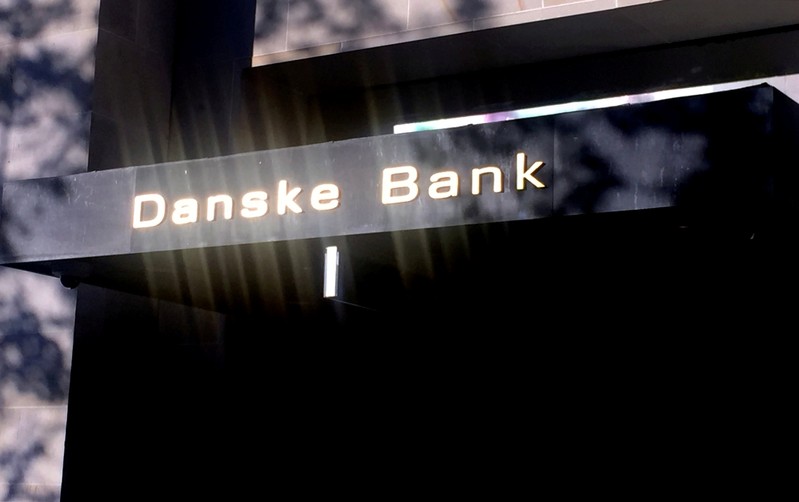
FILE PHOTO: Danske Bank sign is seen on a building in Copenhagen, Denmark, September 27, 2018. REUTERS/Jacob Gronholt-Pedersen/File Photo
October 4, 2018
By Teis Jensen
COPENHAGEN (Reuters) – Danske Bank <DANSKE.CO> faces a criminal investigation by the U.S. Department of Justice over a 200 billion euro ($230 billion) money laundering scandal involving its Estonian branch, increasing long-held investor fears.
Denmark’s largest bank said on Thursday that it had “received requests for information from the U.S. Department of Justice (DOJ) in connection with a criminal investigation relating to the bank’s Estonian branch”.
The bank, which this week appointed Jesper Nielsen as interim chief executive to handle the crisis in the short term
after the resignation last month of Thomas Borgen, said it was cooperating with the U.S. authorities.
Shares in Danske Bank fell by three percent to 160 Danish crowns, their lowest level since January 2015 and a 33 percent decline so far this year, as its investors and customers digested the U.S. investigation and the bank’s decision to halt a share buyback program to bolster its capital.
The mayor of Copenhagen, Frank Jensen, said the Danish capital was looking into ending its cooperation with Danske Bank as a result of the unfolding scandal.
Shareholders have fretted for months over the possibility of U.S. authorities investigating whether Danske Bank broke U.S. rules in allowing payments through its Estonian operation because of the potential for significant penalties.
“We think a fine of $6 billion, unlikely in our view given no sanctions/terror violations have been uncovered as yet after investigating high-risk customers, is already reflected in the price,” Jefferies analyst Kapilan Pillai said in a note.
France’s BNP Paribas <BNPP.PA> reached a record $8.9 billion settlement with U.S. authorities in 2015 to resolve claims that it violated sanctions against Sudan, Cuba and Iran.
Many of the non-resident accounts at Denmark’s Estonian branch were held by entities or individuals in Russia, which is the subject of U.S. sanctions.
Banks doing business in Estonia handled more than $1 trillion in cross-border flows between 2008 and 2017, the country’s central bank said on Wednesday.
Sweden’s Swedbank <SWEDa.ST> said on Thursday there were “no ongoing investigations” into its anti-money laundering practices. Nordea <NDAFI.HE>, the Nordic region’s biggest bank, also said it is not under investigation over alleged money laundering in the Baltics.
WIDENING NET
In a sign of the impact criminal and regulatory investigations in Estonia, Denmark, Britain and now the United States are having on the lender, Danske Bank said it would end its share buybacks after reassessing its capital targets.
It had initially planned to buy shares back worth 10 billion Danish crowns ($1.5 billion) under the program, which should have run until February next year. It had repurchased shares worth 6.8 billion as of the end of last week.
This followed an assessment by Denmark’s Financial Services Authority which said Danske Bank’s compliance and reputational risks had risen. It did not mention the U.S. inquiry in a 12 page follow-up report published by Danske Bank.
The FSA said in May that Danske Bank’s Pillar II capital requirements should rise by 5 billion Danish crowns but has now ordered it to double this to a minimum of 10 billion crowns.
The bank raised its CET1 capital ratio target to around 16 percent from a 14-15 percent target and its total capital ratio to be above 20 percent from an earlier target of above 19 percent.
By end of the second quarter the bank’s CET1 ratio stood at 15.9 percent and its total capital ratio stood at 21.6 percent.
“It is a signal from our side that we would rather be on the safe side, rather than being seen on the other side, when it comes to capital,” Morten Mosegaard, Danske Bank’s interim chief financial officer and chief of staff told Reuters.
Last month the bank said in an internal report commissioned by Borgen that payments totaling 200 billion euros, many of which it described as “suspicious”, had been moved through its Estonian branch between 2007 and 2015.
The findings of the report led to Borgen taking “ultimate responsibility”, although he says he was cleared from a legal point of view, and prompted renewed action by regulators.
The Danish bank’s board has asked Denmark’s FSA to approve the appointment of its head of wealth management Jacob Aarup-Andersen as its new chief executive, Danish online media Finans reported, citing several unnamed sources.
The FSA is due to make a decision next week, Finans reported. The FSA and Danske Bank declined to comment.
Politicians in Europe are calling for stricter measures to prevent money laundering after Dutch financial group ING <INGA.AS> was fined 775 million euros last month after admitting criminals had been able to launder cash through its accounts.
(Reporting by Teis Jensen; Additional reporting by Danilo Masoni in Milan Writing by Alexander Smith; Editing by Jason Neely/Keith Weir)

